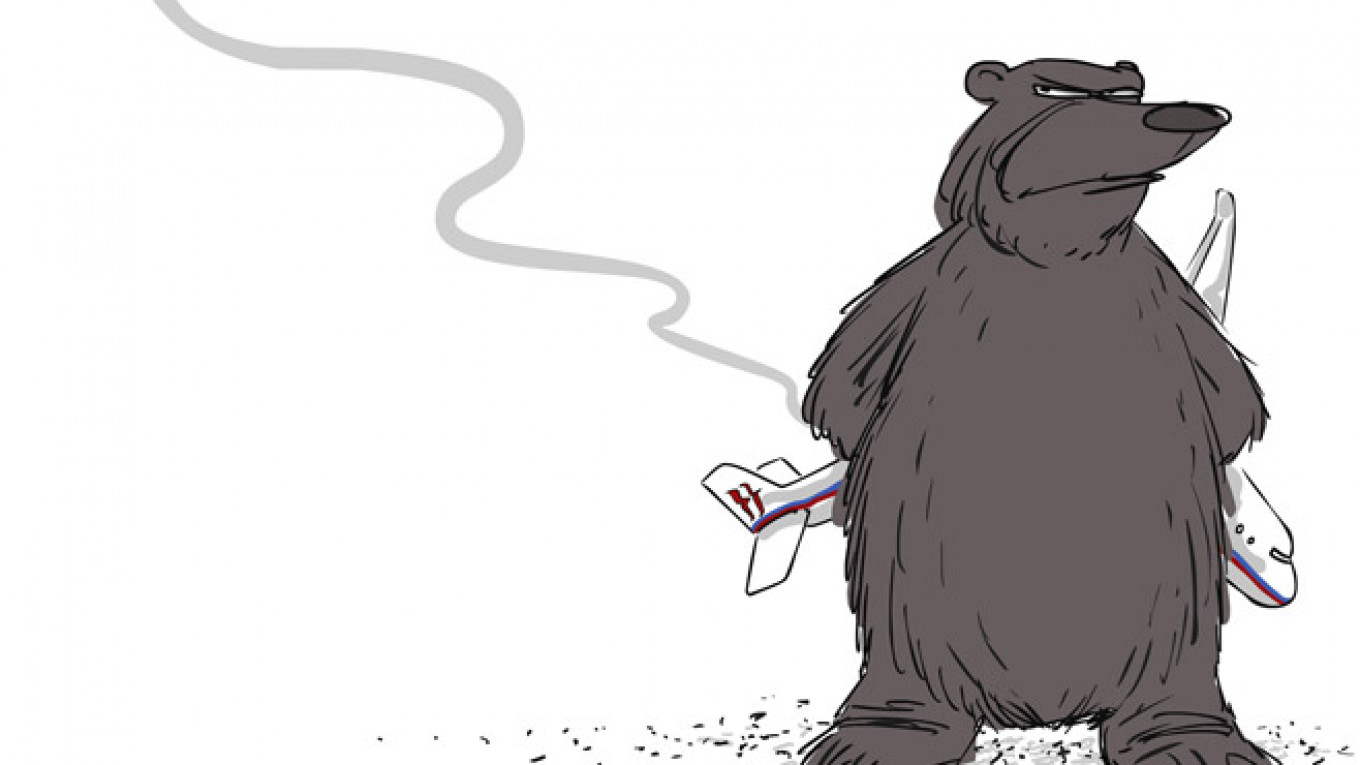More than a century ago the writer Anton Chekhov said, "If in the first act you have hung a pistol on the wall, then in the following act it should be fired." Events in eastern Ukraine seem to be following this script advice.
As sophisticated, powerful and allegedly Russian weaponry gradually accumulated in the hands of various terrorist groups, it was clear that sooner or later it would lead to disaster. The downing of Flight MH17, shot down by a missile fired from a BUK — SA-11 Gadfly, by NATO classification — became that disaster. It was purely accidental that the victims were almost 300 foreign passengers.
The shot from the BUK was the last nail in the coffin of the reassuring theory that a repeat of the Cold War was impossible. As it turns out, it is possible. In fact, its circumstances can be repeated exactly, right down to the shooting down of a civilian passenger liner, just like the way KAL-007 was shot down by a Soviet fighter jet in 1983.
It appears that a full-blown Cold War II is under way. Just like 40 years ago, there are proxy wars taking away dozens and hundreds of lives every day — like in Syria, where the main players are no longer the government and rebels, but foreign governments including Russia, which is providing arms and other support to Syrian President Bashir Assad. Russian diplomats have gotten used to interacting with their Western colleagues with aggressive rhetoric, as if they had taken their cue from Nikita Khrushchev, pounding his shoe on the desk at the United Nations.
The open and honest exchange of information between Russia and the West has almost entirely moved to the Internet. "Western public opinion" is represented on Russian television by marginal figures, from the 9/11 Truthers to leaders of European neo-Nazi parties, interspersed with professional Putin lovers from among the community of Western political experts.
For several years, Russia has been carrying out a quiet war against Western charities and non-government organizations, gradually drumming them out of the country. Meanwhile, over the last few months Western economic sanctions against Russia have been slowly but effectively ramped up.
And despite official denials, economists say that these sanctions can really hurt the Russian economy.
Former Deputy Energy Minister Vladimir Milov predicted in his blog on the radio station Ekho Moskvy's website that "if the stream of Western credit dries up, there will be two main consequences. One, there will be nothing to finance economic development with, and two, the loans will need to be repaid somehow. Most of these loans were rather short-term, so by the end of just this year, Russian companies have to repay foreign loans of about $100 billion. If foreign loans remain inaccessible, the authorities will have no choice but to start printing more money." And the result of that will be a jump in inflation and all the attendant unpleasant consequences.
What could lead East and West out of crisis and put them on normal footing again?
The answer is obviously to normalize the situation in eastern Ukraine. And here the ball is in Russia's court. If the Russian leadership stops the flow of mercenaries, labeled as "volunteers," and military equipment into Ukraine, the Ukrainian army may be able to rout the separatists in a few weeks.
Unfortunately, this would not serve the interests of the "party of war" in Moscow, which is represented not only by generals, but also by oligarchs who are more than ready to divide up the industrial spoils of eastern Ukraine.
The rhetoric, in fact, is even more heated than usual as Kiev moves to take greater control of eastern Ukraine. The ideologist of the "party of war," philosopher Alexander Dugin, wrote this prophesy on his blog: "At present, a large part of the territory of the Donetsk and Luhansk people's republics are controlled by Kiev, but it is absolutely clear that this isn't for long and soon we will launch our offensive … in just a little the offensive will begin. The goal of the Great Offensive is the liberation of Kiev from the Nazi junta."
Fortunately, the megalomaniac Dugin hardly represents the entire Russian population. A June poll by Levada Center revealed that 54 percent of the respondents were worried that Russian participation in a war in eastern Ukraine might lead to World War III. Their opinion is a greater obstacle to the plans of the "party of war" than the Ukrainian army.
Putin can choose to listen either to his hawkish advisors or the majority of Russian citizens who simply want peace. It may be easier to follow his militant leanings in the short term, but doing so risks repeating the mistakes of the politicians of the past, mistakes that Europe paid for with millions of lives in the 20th century.
Victor Davidoff is a Moscow-based writer and journalist who follows the Russian blogosphere in his biweekly column.
A Message from The Moscow Times:
Dear readers,
We are facing unprecedented challenges. Russia's Prosecutor General's Office has designated The Moscow Times as an "undesirable" organization, criminalizing our work and putting our staff at risk of prosecution. This follows our earlier unjust labeling as a "foreign agent."
These actions are direct attempts to silence independent journalism in Russia. The authorities claim our work "discredits the decisions of the Russian leadership." We see things differently: we strive to provide accurate, unbiased reporting on Russia.
We, the journalists of The Moscow Times, refuse to be silenced. But to continue our work, we need your help.
Your support, no matter how small, makes a world of difference. If you can, please support us monthly starting from just $2. It's quick to set up, and every contribution makes a significant impact.
By supporting The Moscow Times, you're defending open, independent journalism in the face of repression. Thank you for standing with us.
Remind me later.








